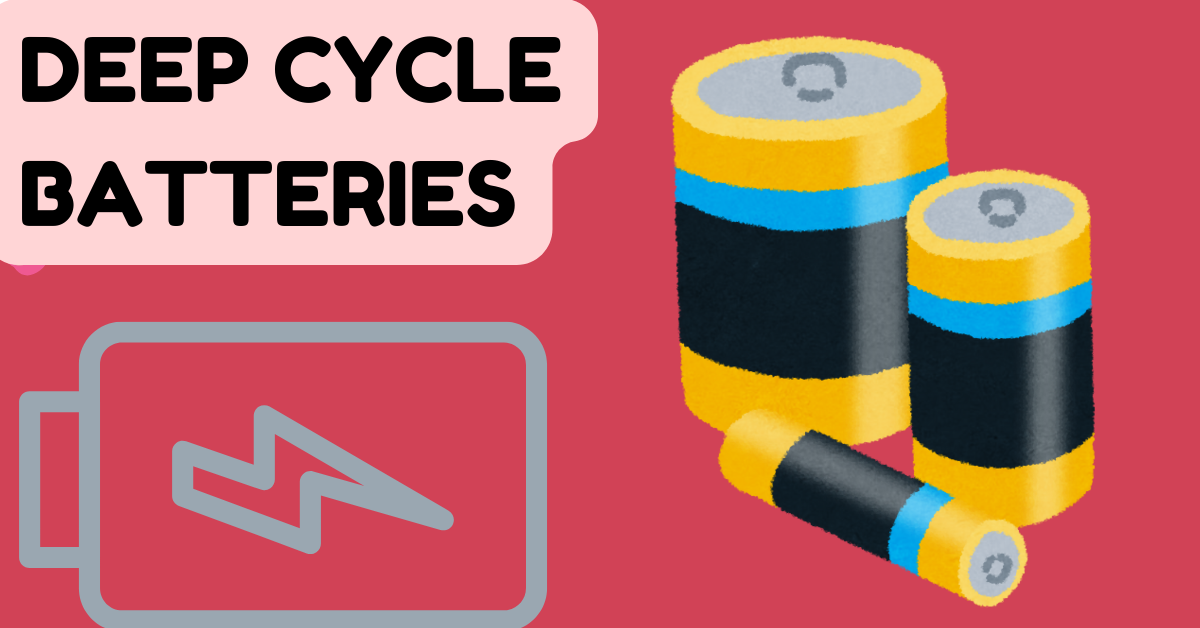When you think about reliable power sources, deep cycle batteries come to mind. These batteries are essential for many applications, from renewable energy systems to recreational vehicles. They are designed to provide a steady amount of power over an extended period. In this article, we’ll delve into the significance of deep cycle batteries, their types, advantages, and maintenance tips.
What Are Deep Cycle Batteries?
Deep cycle batteries are rechargeable batteries designed to deliver a consistent amount of energy over a prolonged period. Unlike standard batteries, which provide a quick burst of energy, these batteries can be discharged down to 20% of their capacity without causing damage. This unique feature makes them ideal for applications that require sustained power, such as:
- Solar energy systems
- Electric vehicles
- Marine applications
- Recreational vehicles (RVs)
- Backup power supplies
Types of Deep Cycle Batteries
Understanding the types of deep cycle batteries available can help you choose the right one for your needs. Here are the main types:
1. Lead-acid batteries
Lead-acid batteries are the most common type of deep cycle batteries. They are affordable and widely available. However, they can be heavy and may require regular maintenance. They come in two main types:
- Flooded Lead-Acid Batteries: These require maintenance and need to be topped up with water regularly.
- Sealed Lead-Acid Batteries: These are maintenance-free and can be installed in any position.
2. Absorbent Glass Mat (AGM) Batteries
AGM batteries are a type of sealed lead-acid battery. They use a fiberglass mat to absorb the electrolyte, which makes them spill-proof and safer to use. They are more efficient than flooded lead-acid batteries and require no maintenance. Additionally, AGM batteries can handle high discharge rates, making them suitable for various applications.
3. Gel Batteries
Gel batteries are another type of sealed lead-acid battery. They use a gel-like electrolyte, which makes them safe for use in enclosed spaces. Gel batteries can handle deep discharges, but they are generally more expensive than AGM batteries. They are an excellent option for applications where safety and space are concerns.
4. Lithium-Ion Batteries
Lithium-ion batteries are gaining popularity due to their lightweight and high energy density. They can be discharged deeper than lead-acid batteries without damage. Additionally, they have a longer lifespan, often lasting more than a decade. While they come at a higher price point, the benefits they offer can justify the investment. According to a report from the International Energy Agency, lithium-ion batteries have a lifespan of 2,000 to 7,000 cycles, depending on usage and maintenance.
Comparison of Deep Cycle Battery Types
Battery TypeLifespan (Cycles)WeightMaintenanceCostLead-Acid200-1,500HeavyRequires regularLowAGM500-1,000ModerateMaintenance-freeModerateGel500-1,000ModerateMaintenance-freeHighLithium-Ion2,000-7,000LightMaintenance-freeHighest
Advantages of Deep Cycle Batteries
Reliable Power Supply
Deep cycle batteries provide a consistent energy source, making them ideal for applications where a steady power supply is critical. Whether you are powering your RV during a camping trip or providing backup energy for your home, you can rely on these batteries.
Long Lifespan
When maintained properly, deep cycle batteries can last for years. For instance, lithium-ion batteries can have a lifespan of up to 15 years, significantly reducing the need for replacements.
Eco-Friendly Options
Many modern deep cycle batteries, especially lithium-ion ones, are more environmentally friendly. They produce less waste and can often be recycled, reducing their impact on the planet.
Versatile Applications
From powering boats to storing energy from solar panels, deep cycle batteries have various applications. They can adapt to your energy needs, making them a versatile choice.
Cost-Effective Energy Solutions
While the initial cost may seem high, the long-term savings associated with deep cycle batteries can be significant. They reduce the need for frequent replacements and lower energy costs in the long run.
Maintenance Tips for Deep Cycle Batteries
To get the most out of your deep cycle batteries, proper maintenance is essential. Here are some tips to ensure they operate efficiently:
Regularly Check Water Levels
For flooded lead-acid batteries, check water levels every month. Ensure the electrolyte covers the lead plates. If the water level is low, add distilled water to prevent damage.
Clean the Terminals
Corrosion can build up on battery terminals, affecting performance. Regularly clean the terminals using a mixture of baking soda and water to prevent corrosion.
Monitor Battery Voltage
Use a voltmeter to check the voltage of your batteries regularly. A fully charged deep cycle battery should read about 12.6 volts. If the voltage drops below 12.4 volts, it may need charging.
Avoid Over-Discharging
Discharging your deep cycle batteries below 20% can significantly reduce their lifespan. Try to recharge them before they drop to this level.
Store Properly
If you need to store your deep cycle batteries, keep them in a cool, dry place. Ensure they are fully charged before storage to prevent sulfation.
The Future of Deep Cycle Batteries
The future looks bright for deep cycle batteries, particularly with the increasing demand for renewable energy solutions. As technology advances, we can expect improvements in battery efficiency, longevity, and affordability. Companies are investing heavily in research to enhance battery technologies.
“Battery technology is evolving rapidly,” says Dr. Lisa Smith, an industry expert. “As we transition to cleaner energy solutions, deep cycle batteries will play a crucial role in storing renewable energy.”
Conclusion
In conclusion, deep cycle batteries are essential for various applications, offering reliability, versatility, and eco-friendliness. Understanding the different types, advantages, and maintenance tips can help you make informed decisions. Whether you're camping in the wilderness or relying on backup power at home, these batteries provide the energy you need to stay connected and comfortable.





Comments